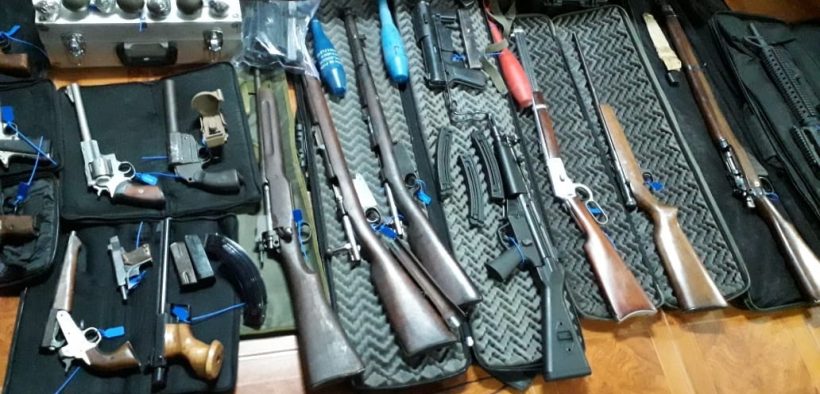Argentina’s Evolving Role in the Global Arms Trade

A recent weapons seizure by Argentine authorities of about 1,000 guns and hundreds of explosives is the nation’s largest in history, according to officials.
(By Josefina Salomón and Carolina Sampó, InSight Crime) While the seizure of hundreds of high-powered weapons in Argentina and a subsequent investigation offer fresh clues about criminal dynamics in the infamous border region with Paraguay, the country’s role in the global arms trade remains unclear.
On June 26, authorities in Argentina seized hundreds of high-powered weapons and arrested more than 20 people. Authorities described the international operation as the largest in the country’s history.
An investigation, started in late 2018, found that the arms — including rifles, machine guns and anti-aircraft ammunition — were part of an intricate global operation.
Investigators said parts shipped from the United States and Europe were assembled in locations across Argentina. The arms were then sent by land to neighboring Paraguay. Authorities believe the arms were then sold to Brazil’s top criminal organizations: The First Capital Command (Primeiro Comando da Capital — PCC) and Red Command (Comando Vermelho).
InSight Crime Analysis
The investigation of the arms seizure in Argentina, which is still ongoing, has revealed new clues about criminal dynamics in one of South America’s most prolific criminal hotspots. Below, InSight Crime looks at three main takeaways from the bust.
1. Criminal Groups Eyeing New Routes
Until recently, criminal groups in Paraguay acted as intermediaries for weapons trafficked from the United States to Brazil, ensuring a steady flow.
There are a number of reasons for this. Taking advantage of lax weapons laws in the United States, crime groups have found it relatively easy to send gun parts through tried-and-tested contacts in Paraguay. There, they were assembled and sent via land to Brazil through routes commonly used to traffic illicit goods.
But a ban on arms imports imposed by Paraguay in 2018 may have forced the groups to test alternative routes. This may explain why there were so many weapons seized in Argentina, something that had not been seen before.
Rodrigo Bonini, the director of investigations at Argentina’s Security Ministry, says that governments in the region need to work together when developing anti-crime policies.
“When one country defines policies to tackle organized crime they have to have a regional perspective, because otherwise the countries left out will be negatively affected,” he told InSight Crime.
2. Criminal Eyes Set on Argentina
The weapons seizure in Argentina was historic because of the quantity of firearms and ammunition that was seized, but also because the country hadn’t until now been a major player in the regional or international arms trade.
Argentina is home to only a small domestic arms market, according to a 2015 report by the United Nations Office on Drugs and Crime (UNODC).
The country’s strategic location, the presence of a large port serving as a direct link to Europe, well-established drug trafficking routes to neighboring Paraguay and a history of corrupt customs officials could help explain why criminal groups might be testing out the country as a new link in the arms trafficking chain.
But these groups might confront new challenges amid the growing ties among governments in the region, particularly in the fight against organized crime.
The relationship between the administration of Argentine President Mauricio Macri and his counterparts in the United States, which has strengthened in recent years, making operations like the arms seizure more successful. Authorities in Argentina, Brazil and Paraguay are also beginning to collaborate more as the three countries attempt to curb the expansion of crime groups.
3. Brazil Crime Groups Growing Even More Powerful
The fact that Argentina has only a domestic arms market that lacks the kind of sophisticated weapons seen in the seizure forced authorities to look elsewhere for clues as to where the arms were destined.
Although unconfirmed, all fingers point to Brazil’s two most powerful criminal groups — the PCC and Red Command — as the buyers.
Both groups, especially the PCC, have been gaining power in Brazil and internationally.
Although there isn’t enough evidence to suggest that the group has attempted to expand into Argentina, authorities told InSight Crime that they are monitoring the situation carefully with a particular eye along the country’s northern border, where the three countries meet.
Judging by the latest weapons seizure, they are wise to do so.
This article was republished with permission from InSight Crime and was written with the collaboration of the Center for Studies on Transnational Organized Crime (Centro de Estudios sobre Crimen Organizado Transnacional – CeCOT) at the University of La Plata, Argentina.












“Life is nothing but a competition to be the criminal rather than the victim.” — Bertrand Russell